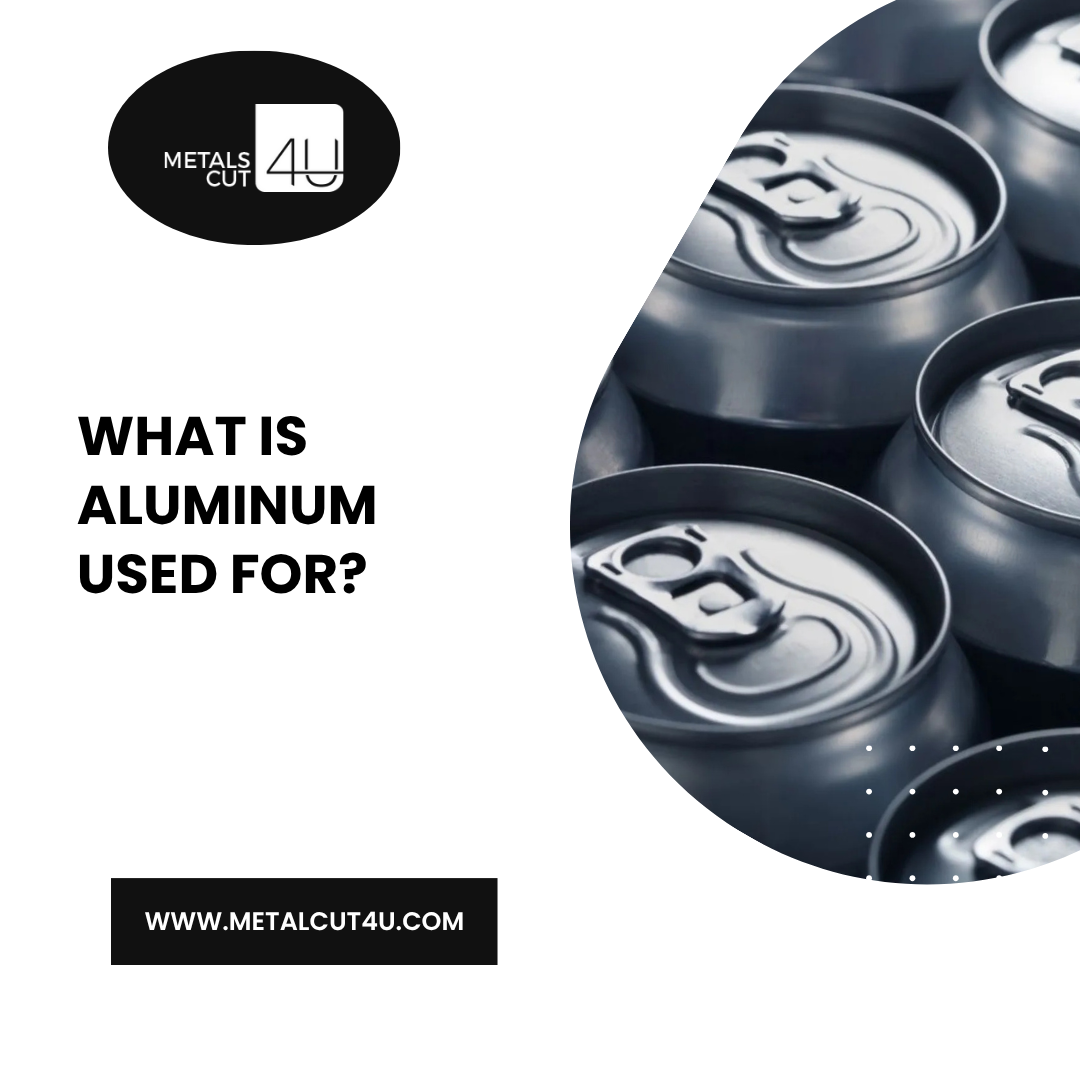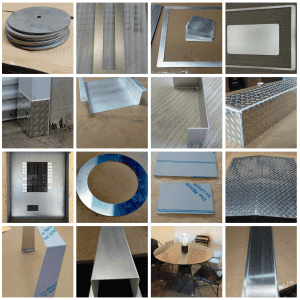What Is Aluminum Used For? Common Uses Of Aluminum

Aluminum is one of the most widely used metals worldwide, with its influence and applications spanning numerous and diverse industries. From aerospace to packaging and from construction to electronics, its presence is everywhere. The reason for its pervasive adoption lies in its truly unique and highly advantageous properties, which collectively make it a consistently preferred material for a vast array of manufacturing and production processes globally.
In this article, we will explore what aluminum is, the common uses of aluminum, and the many ways it contributes to our daily lives and industrial activities.
What Is Aluminum?
Aluminum is a chemical element with the symbol Al and atomic number 13. It is a lightweight, silvery-white metal known for its excellent corrosion resistance and good conductivity. This element is abundant in the Earth's crust, making up about 8% of its solid surface by weight, making it the third most common element after oxygen and silicon. But how is aluminum made from this abundant raw material?
It's produced primarily from bauxite ore through a two-step process: first, bauxite is refined into alumina (aluminum oxide) using the Bayer process, and then this alumina is smelted into pure aluminum metal through the energy-intensive Hall-Héroult electrolytic process, which involves dissolving alumina in molten cryolite and passing a strong electric current through it.
Aluminum is highly valued for its combination of physical and chemical properties. It is soft and malleable, meaning it can be shaped and formed with relative ease. Despite its lightweight, aluminum exhibits strong mechanical characteristics, allowing for widespread uses of aluminum in applications requiring both strength and reduced weight.
What Is Aluminum Used For?
The uses of the aluminum element are incredibly diverse, ranging from household items to critical components in aerospace. Further, knowing what is the element aluminum used for can help one appreciate its role in modern technology and industry.
Aluminum’s properties, including resistance to rust and corrosion, make it ideal for outdoor and marine applications. It is also prized in electrical systems for its ability to conduct electricity effectively, often serving as a cost-effective alternative to copper in power transmission.
In addition, aluminum plays an essential role in packaging materials, from beverage cans to food containers, due to its ability to preserve freshness and withstand various temperatures. The metal’s recyclability adds to its environmental appeal, making it a sustainable choice in many sectors. For those looking to work with this versatile material, finding a reliable supplier to buy aluminum sheet metal is often the first step.
Why Aluminum Is Used Everywhere?
Aluminum’s popularity is driven by several key characteristics:
-
Lightweight: Aluminum weighs about one-third as much as steel, allowing for easier handling and lower transportation costs.
-
Strong: Despite its low weight, aluminum offers high strength, especially when alloyed with other metals.
-
Resistant to corrosion: A natural oxide layer forms on its surface, protecting it from rust and chemical damage.
-
Durable: Aluminum withstands harsh weather and environmental conditions over time.
-
Ductile and Malleable: It can be drawn into wires or rolled into thin sheets without breaking.
-
Conductive: Aluminum effectively carries electric current, making it useful in wiring and electrical components.
-
Odorless: It does not emit any odor, which is important for packaging food and beverages.
Another significant advantage of aluminum is its recyclability. Aluminum scrap can be recycled indefinitely without losing quality. Recycling aluminum requires only about 5% of the energy needed to produce new aluminum from ore, making it an energy-efficient and environmentally friendly option.
Most Common Uses of Aluminum
The versatility of aluminum allows it to be utilized across a variety of industries. Here are some of the common uses of aluminum metal that have a significant impact:
Construction
Aluminum is extensively used in the construction sector for window frames, doors, roofing, and siding. Its resistance to corrosion and light weight make it an excellent choice for structural components. Aluminum also provides good thermal efficiency, which helps to insulate buildings. This versatility extends to specialized products like aluminum diamond plate sheets, often used for their anti-skid properties and decorative appeal in high-traffic areas or industrial settings within construction.
Transportation
The transportation industry uses aluminum in automobiles, airplanes, trains, and ships. The metal helps reduce the overall weight of vehicles, improving fuel efficiency and reducing emissions. Aircraft bodies and car parts often incorporate aluminum alloys to balance strength and weight.
Packaging
One of the most familiar and important uses for aluminum is in packaging materials such as cans, foil, and containers. Aluminum packaging protects contents from light, moisture, and contaminants, extending shelf life and maintaining quality.
Electrical Systems
Aluminum wire is commonly used for electrical power transmission and distribution. Although copper is a better conductor, aluminum’s lighter weight and lower cost make it a practical choice for overhead power lines.
Consumer Goods
Many household items and electronics include aluminum components. It is used in kitchen utensils, appliances, laptops, smartphones, and more. Its ability to dissipate heat and resist corrosion makes it ideal for these products, highlighting the numerous uses for aluminum in our daily lives.
Machinery
Aluminum is also important in manufacturing machinery and equipment. Its machinability and strength allow for components that perform well under mechanical stress while remaining lightweight, further expanding the common uses of aluminum. Given its widespread application, understanding how to weld aluminum is a critical skill for many in these industries.
Solar Panels
Aluminum frames are widely used to support solar panels. The metal’s durability and corrosion resistance ensures a long lifespan even in outdoor conditions, which helps protect the panels and maintain efficiency. This is just one of the many practical common uses of aluminum.
Final Word on What Is Aluminum Used For?
Aluminum is a versatile and highly valuable metal found in many industries worldwide. From everyday household items to critical industrial applications, the uses of aluminum demonstrate its unmatched balance of strength, lightness, and durability. Whether in construction, transportation, packaging, or electrical systems, aluminum continues to be an important material that supports innovation and sustainability.
Ready to explore how uses of aluminum can serve your specific needs? Contact us today to learn more about our services and how you can benefit from aluminum sheet metal fabrication tailored to your requirements.
FAQs About Aluminum Uses
1. What is made of aluminum?
Aluminum is used in a wide range of products, including vehicles, aircraft, packaging materials, electrical wiring, kitchen utensils, and construction components.
2. What are 10 uses of aluminum?
10 important uses of aluminum include transportation (cars, airplanes), packaging (cans, foil), construction (windows, roofing), electrical wiring, consumer electronics, machinery, solar panel frames, cooking utensils, bicycles, and aerospace parts.
3. What are the 3 main uses of aluminum?
The primary uses of aluminum elements are in the transportation, construction, and packaging industries.
4. What is the daily use of aluminum?
Everyday items such as beverage cans, foil wraps, kitchen appliances, and smartphones often contain aluminum parts.
5. What is the most commonly used aluminum?
The 3003 aluminum alloy is frequently chosen for a wide range of everyday applications, given its decent strength and ease of fabrication.
6. What is pure aluminum used for?
Pure aluminum is mainly used in applications requiring excellent corrosion resistance and conductivity, such as electrical cables and chemical equipment.
7. Where is aluminum used most?
Aluminum is most widely used in the transportation and packaging industries.
8. When not to use aluminum?
Aluminum should be avoided when in contact with strong alkalis or acids, as it can corrode in those conditions.
9. What are the disadvantages of aluminum?
Aluminum is weaker than some metals, like steel, and may not be suitable for heavy load-bearing applications. It can also corrode when exposed to certain chemicals.
10. What happens when aluminum is in contact with other metals?
Aluminum can experience galvanic corrosion when in contact with dissimilar metals, especially in the presence of moisture.
11. What are the most common grades of aluminum?
Common grades include 1100 (commercially pure), 2024, 3003, 5052, 6061, and 7075 alloys, each suited for different applications based on strength and corrosion resistance.
